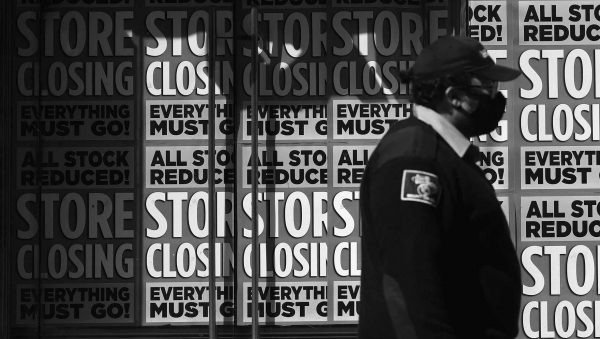
Impact of coronavirus and quarantine on the economy and work
2020 will be remembered by people not only for the pandemic. The world media, describing the impact of coronavirus and quarantine on the economy and work, have applied ambiguous rhetoric. So, nowadays any problem is considered to result from coronavirus. Thus, the reason for the loss of jobs is pandemic, etc. However, it is wrong to substitute concepts: it is not about the coronavirus, but about the reaction of the authorities to it. Below we will discuss the substitution of concepts – a mass “symptom” of modern news.
Stock markets in the coronavirus era

Taking into account the deteriorating forecasts, countries are gradually lowering their expectations regarding GDP levels. Experts are constantly reviewing economic scenarios. However, practically all countries (except China) tend to face decreasing predictable results. February 2020 is one of the most difficult months for the stock market in the past three years. The leading stocks of the world fixed widespread falls.
The situation in the stock markets makes it possible to identify the industries that will be most affected by the pandemic. However, the events demonstrate that the economy is already suffering. The tourism, retail, energy production, and sales sectors, as well as the technology industry, have suffered huge losses. Profits in these areas have fallen by 10%. Some companies have lost 20% of their shares. The tourism sector has faced a record drop in profits – by 70-90%. The automotive market has suffered too: experts predict a further decline in profits by up to 2.5% There were several reasons for such phenomena in an economy:
- closed borders and supply disruptions (logistics were also disrupted);
- decrease in demand for goods.
Economic risks during the pandemic
Passenger transportation faced the impact first. Quarantine proved to be not so strict and disastrous for larger companies. Small and medium-sized businesses suffered the hardest. Household consumption is at record lows. The volume of “free funds” in households is increasing. The volume of personal consumption remains at the same level. People worry about the future and are afraid of uncertainty. This makes the population use the saving model of behavior.
Stoppages in the field of international logistics create problems in shaping additional cost. The global market depends on Chinese users – as the key “players”. Today Asian population abstains from excess expenditures. This fact explains why the U.S. economy associated with China is not getting large amounts of profit.
Outlook for the economy renewal in 2021
Crisis in the field of engineering
The last twenty years led to an increase in the section of renewed power engineering. The key points are gradually occupied with “green” engineering. Carbon, petroleum, atomic stations move away to the second plan. The pandemic crisis caught the energy industry by surprise. First, the chains of goods deliveries were destroyed. Second, the amount of funding for the sectors has decreased. Experts predict the worsening of short-term and long-term prospects in the energy industry. Specialists from the International Energy Agency predict the resumption of the economy in 2021. The chemical, steel, and wood-processing sectors are expected to take to the forefront of development.
“The cooling” of the world market
The coronacrisis allows cautious optimistic forecasts. At the peak of the pandemic, U.S. agencies recorded a 14.7 percent increase in the unemployment rate. The unemployment rate rose to this point during the Great Depression. Today this number is decreasing, which can’t but please. The economies of Germany and China acquire steady growth rates. On the other hand, not all experts unanimously agree with the optimistic forecasts. Thus, positive dynamics on the world market is the probable consequence of intensive budgetary infusions. Therefore, there is a possibility of “re-cooling” the market.
The quarantine and unemployment

Unemployment is one of the most pressing and still unresolved problems of the coronacrisis. The world’s largest companies are carrying out periodic redundancies of states. Thus, AP Moller-Maersk A/S (the company-leader in the container transport market) is carrying out “anti-crisis” restructurings. Thousands of people are losing their jobs because of such “restructurings”. The same trends are observed in the policies of other giant companies: Ford Motor Co., United Airlines Holdings Inc., Amazon, etc. Katherine Mann, the chief economist at Citi Global, says that businesses expect to return to their previous levels by 2022. In the same period, companies hope to reduce the unemployment rate.
The problem of social insecurity
The European Union, in its quarantine policy, is simultaneously concerned about the unprotected segments of the population. First of all, they are young people, pensioners and people involved in the activities of small and medium-sized businesses. However, not all countries are ready to meet the needs of their population. Thus, in Ukraine, utility tariffs are increasing, small businesses are being destroyed. As a result, quarantine riots may occur. During the pandemic, people have faced a choice: fear of being left without a livelihood and fear of becoming infected with a “new virus”.
The concept of lockdown
Coronavirus times have led to the expansion of our lexicon. Thus, the concept of “lockdown” is used along with the terms “saturation,” “ALV,” “cytokine storm”. Such measures worsen the economic climate because they suggest:
- closure of borders (external and internal);
- ban on the work of the service sector, restaurants, cafes, cultural institutions (cinemas, theaters), shopping centers, hotels, gyms, stores, etc.;
- stop of public transport;
- ban on the work of recreational establishments, beauty salons, hairdressing salons and even dentistry;
- postponement of planned operations;
- closure of educational institutions.
Lockdown forms differ depending on the situation. The population reacts negatively to such measures. Thus, the general feeling of anxiety forces people to economize harshly even on the most necessary things. At the same time, consumers are in no hurry to return to their usual regime of spending money. This is due to the fear of repeated epidemic outbreaks. In any case, now the states are in no hurry to introduce the so-called “national quarantines”. Countries deal with pandemics with adaptive (local) protection strategies.
Repeated lockdowns
Experts say the lockdown policy has thrown the European market a couple of decades years back. The GDP level has fallen by 14.5%. That’s more than during the 2009 global crisis. For comparison, during that period, economic indicators fell by 3.1%. However, countries are showing unequal levels of economic stagnation. In Spain, the drop in GDP reached 18.5%, in Portugal – 14.1%, in France – 13.1%. The countries of Eastern Europe suffered economically less, at first glance. Thus, Lithuania reduced economic growth by 5.1%, Latvia – by 7.5%, the Czech Republic – 8.4%, respectively.
In the summer of 2020, countries eased quarantine restrictions, intending to revive the tourism industry. International flights and transit between countries resumed again. Resorts started working. Not all of them, though. Turkey turned out to be the most loyal to tourists. There were minimal quarantine restrictions. Other states require foreigners to have a Covid-19 absence certificate. However, in autumn, the authorities tightened the quarantine “screws” again. France, Spain, Italy have tried to impose a curfew on their territories. But this venture ran into enormous resistance from the population. Specialists from the UN, on the other hand, noted that due to quarantine measures in the world, the level of poverty will increase significantly.
“The New Middle Ages”: Slowdown in Economic Development
Economic stagnation raises concerns in the European Union not so much because of the pandemic itself, but because of the fight against it. In the summer of 2020, the heads of European states approved the budget for the period from 2021 to 2027. The main position on the agenda is the restoration of the economic power of the regions. It is planned that European countries will receive grant aid, for which 390 billion euros have already been pledged. In 2021, the overall GDP growth (for the European Union) is projected at the level of 5.2%. However, at the moment, the level of GDP is falling, and the number of corporate bankruptcies is growing.
Why are quarantine measures dangerous? Most of the taxes to the state budget come from small and medium-sized businesses. In addition, there is a value-added tax on goods. With the decrease in the purchasing power of the population, the level of taxes that go to the budget also falls. As a result, the treasury suffers from a “hole” formed there. Demand stops making supply because companies cannot always meet customer demands. The reason is a disruption in the supply chain of goods and problems with logistics.
Corporate bankruptcies
Let’s talk in more detail about the problem of corporate bankruptcies. This topic is especially acute for the United States. Experts say that America managed to postpone the disaster, but a wave of bankruptcies is inevitable. The level of GDP in the United States has decreased by 5.6% because of the coronavirus pandemic. The country will probably be able to catch up in 2022. Next year, economists predict GDP growth at a level of 3.3%. However, warning signals continue to be received. Thus, the number of applications for reorganization from companies increased by 48% (compared to the last year). Experts warn: by the end of 2020, the level of corporate bankruptcies will increase by 43%.
Coronavirus times brought another concept out of the shadows – “zombie companies”. These are enterprises that are forced to repay more loans than they receive. That is, the expenses of such companies exceed their profits. In this regard, the percentage of the debt burden of business in the United States is increasing. US and European authorities offer assistance to businesses (for example, by paying 70% of salaries). However, not all companies will survive the coronavirus crisis. Another problem is that small business bankruptcy will increase unemployment levels. After all, it is small businesses that provide the lion’s share of jobs – especially in countries with developing economies.
Economic Forecasts
The coronavirus pandemic coincided with sharp political changes in many countries. Thus, American elections are one of the key factors that affect the world economy. Experts argue that Biden’s victory in the presidential race will lead to the dollar drop. If Trump wins, on the contrary, the dollar will strengthen its position. Therefore, a number of events affect the economic sector – especially the post-crisis one. In general, entrepreneurs come to the conclusion that economic recovery will take from six months to a year. More pessimistic forecasts name two, three, and even six years as the time required for the recovery from the crisis.
Government aid would help businesses survive. However, on the territory of the CIS, such support reaches only a small part of enterprises (one company out of ten). Ukraine and Russia offer credit programs to small and medium-sized businesses. But it is unlikely that new debts – amid growing delinquencies in payments – will solve the problem. Not all countries are reducing tariffs, insurance premiums, and tax rates for their population. Private enterprises send employees on indefinite leave at their own expense. In fact, this is nothing more than hidden unemployment. Against the background of falling economic growth, another problem arises – the lack of jobs. Desperate to find work in their home countries, citizens from the CIS go to labor migration.
Remote work is a new trend of 2020
A popular trend in 2020 is the transition to remote work. The ability to work from home has demonstrated the uselessness of offices. As a result, many companies began to think about the expediency of maintaining office space. Online activity has led to an increase in the shares of companies specializing in employee communication (Slack, Zoom, Skype, etc.). Nevertheless, 2020 has definitely taught us one thing – not to trust the illusion of stability. With the news of a working and effective vaccine hitting the market, Zoom’s stock has fallen sharply.
Decline in consumption volumes
The pandemic crisis has also led to a drop in consumption. This negative trend affected 90% of products. The service sector has also suffered greatly. Restaurants survived by working on takeout. Lots of stores went online. The field of online trading and online banking has expanded. Pharmaceutical corporations and private laboratories have benefited too. Expensive laboratory services have been repeatedly criticized because the test for detecting coronavirus costs over $ 30. In general, almost every country is experiencing destabilization of the domestic market.
Long-term impact of the pandemic on business
Economics and politics are two sisters who never part. The economic crisis also provokes political instability. Experts predict the so-called “Japaneseization” of the economy, which is linked to the backdrop of coronavirus processes, This trend suggests that the volume of government and corporate debt will increase. Central banks will influence the support of the private sectors. So, banks maintain a relatively acceptable dollar exchange rate, are engaged in budget injections and redemption of government bonds.
Globalization is under attack. At the moment, researchers have not come to a consensus regarding the future of the globalized world. Most of the experts emphasize that the business will focus on the Asian markets. The factors of motivation for entrepreneurship will remain in place. However, problems with logistics will force major global corporations to relocate production facilities. Today they are concentrated in Asia. In the future, this trend may change. China is rapidly reviving its economy after the crisis. In the autumn of 2020, this is almost the only country that demonstrates economic growth.
Conclusions: which industries have been hit hardest by quarantine?
More than 40 countries around the world have simultaneously introduced strict quarantines. This turn of events is a real shock to the economic environment. Both businesses and consumers were affected. Companies urgently stopped working, transferred employees on vacation – at the behest of governments. Enterprises refused to fulfill their obligations, putting customers at a disadvantage. The world was shaken by a supply crisis with high demand. Travel agencies, transportation, catering, entertainment are the industries that were hit first. The fear of global hunger has provided only the agricultural sector with a large number of orders.
Later, the supply crisis was supplemented by a demand crisis. Consumers, horrified by the quarantine measures and the global crisis, stopped spending money. Only the most essential goods were bought. People refused to buy expensive items like televisions and cars. The housing market has also suffered. Pharmaceuticals are among the leaders in the areas that have benefited from quarantine. These companies have been freed from the burden of quarantine restrictions (like agriculture). The demand for food and medicine remains consistently high.






It’s really a very difficult situation, I’ve been at home for almost 2 months and it almost drove me crazy, how is it possible to survive in such a turbulent world and get out of here with a normal mental state, I still can’t understand! I used to wear a mask every time I was sick, but when I have to wear a mask everywhere, I’m going to have breathing problems anyway!
Most of the employees have started to transfer to the online form of work, as well as me. It was difficult for me to get used to working in one place and this leads to problems with my back, lifestyle, and health in general. But there are also advantages in this, firstly, I stayed at my workplace while many lost it, and the need to travel to and from work also disappeared, which very cool saves 2 hours of time. And you don’t have to see people every day